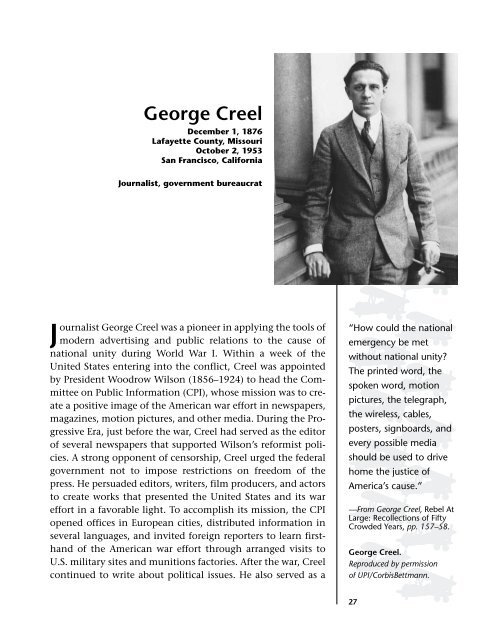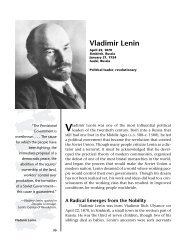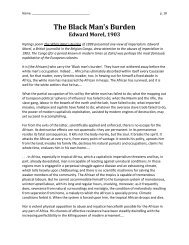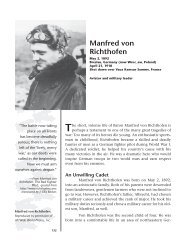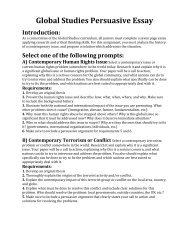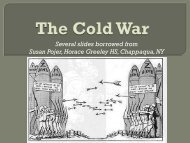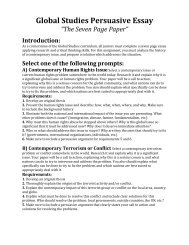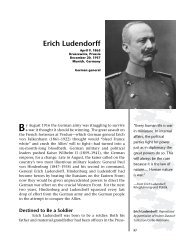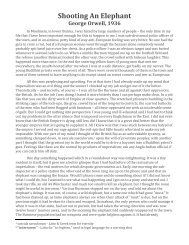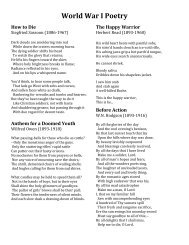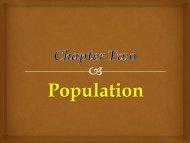George Creel
George Creel
George Creel
Create successful ePaper yourself
Turn your PDF publications into a flip-book with our unique Google optimized e-Paper software.
<strong>George</strong> <strong>Creel</strong><br />
December 1, 1876<br />
Lafayette County, Missouri<br />
October 2, 1953<br />
San Francisco, California<br />
Journalist, government bureaucrat<br />
Journalist <strong>George</strong> <strong>Creel</strong> was a pioneer in applying the tools of<br />
modern advertising and public relations to the cause of<br />
national unity during World War I. Within a week of the<br />
United States entering into the conflict, <strong>Creel</strong> was appointed<br />
by President Woodrow Wilson (1856–1924) to head the Committee<br />
on Public Information (CPI), whose mission was to create<br />
a positive image of the American war effort in newspapers,<br />
magazines, motion pictures, and other media. During the Progressive<br />
Era, just before the war, <strong>Creel</strong> had served as the editor<br />
of several newspapers that supported Wilson’s reformist policies.<br />
A strong opponent of censorship, <strong>Creel</strong> urged the federal<br />
government not to impose restrictions on freedom of the<br />
press. He persuaded editors, writers, film producers, and actors<br />
to create works that presented the United States and its war<br />
effort in a favorable light. To accomplish its mission, the CPI<br />
opened offices in European cities, distributed information in<br />
several languages, and invited foreign reporters to learn firsthand<br />
of the American war effort through arranged visits to<br />
U.S. military sites and munitions factories. After the war, <strong>Creel</strong><br />
continued to write about political issues. He also served as a<br />
“How could the national<br />
emergency be met<br />
without national unity<br />
The printed word, the<br />
spoken word, motion<br />
pictures, the telegraph,<br />
the wireless, cables,<br />
posters, signboards, and<br />
every possible media<br />
should be used to drive<br />
home the justice of<br />
America’s cause.”<br />
—From <strong>George</strong> <strong>Creel</strong>, Rebel At<br />
Large: Recollections of Fifty<br />
Crowded Years, pp. 157–58.<br />
<strong>George</strong> <strong>Creel</strong>.<br />
Reproduced by permission<br />
of UPI/CorbisBettmann.<br />
27
consultant on labor union issues, and he was an unsuccessful<br />
candidate for the nomination to be governor of California in<br />
1934. However, <strong>Creel</strong> remains best known for his groundbreaking<br />
work in public information. To this day, the CPI is<br />
regarded as the forerunner of later government efforts to influence<br />
the news media, such as the Office of War Information<br />
during World War II (1939–45), as well as the United States<br />
Information Agency.<br />
A Newspaper Man<br />
<strong>George</strong> <strong>Creel</strong> was born in Lafayette County, Missouri,<br />
on December 1, 1876. He was the son of Henry Clay <strong>Creel</strong>, an<br />
officer in the Confederate army during the Civil War<br />
(1861–65), and Virginia Fackler <strong>Creel</strong>, a member of an old Virginia<br />
family. The <strong>Creel</strong>s moved to Missouri after the Civil War,<br />
and young <strong>George</strong> went to the public schools in Kansas City.<br />
He wrote for the school newspaper but left high school before<br />
graduation to travel around the country. In 1898, he moved to<br />
New York City, where after working as a day laborer (usually an<br />
unskilled person who works for day wages), he landed a newspaper<br />
job writing for the New York Journal. By 1900, <strong>Creel</strong> had<br />
returned to Kansas City with his friend Arthur Grisson. The<br />
two founded a weekly newspaper, the Kansas City Independent,<br />
to which <strong>Creel</strong> contributed light verse and essays. Politically,<br />
<strong>Creel</strong> leaned toward leftwing (a political position advocating<br />
radical change in the government) and even socialist (shared<br />
or government ownership of production and goods) platforms,<br />
and he used his influence as a publisher to help elect<br />
the reformer Joseph Wingate Folk as governor of Missouri.<br />
<strong>Creel</strong> also published a book of poetry titled Quatrains of Christ.<br />
In 1908, <strong>Creel</strong> turned over the Independent to two<br />
women editors and moved to Colorado, where he became an<br />
editorial writer for the Denver Post. After serious disagreements<br />
with the paper’s owners, he returned to New York for a year to<br />
write for a number of magazines, then returned to Denver as<br />
editor of a competing newspaper, the Rocky Mountain News. It<br />
was during this period that he became friends with Ben B.<br />
Lindsay, a progressive judge who strongly influenced <strong>Creel</strong>’s<br />
political positions. <strong>Creel</strong> soon acquired a national reputation<br />
as a muckraker, the name given to reform-minded journalists<br />
who wrote exposés of social injustice during the early twenti-<br />
28 World War I: Biographies
eth century. In his editorials, <strong>Creel</strong> strongly endorsed the election<br />
of Woodrow Wilson as president in 1912. In 1914, <strong>Creel</strong>,<br />
Lindsay, and the poet Edwin Markham worked together on<br />
writing a book titled Children of Bondage, which criticized child<br />
labor in the United States. Two years later, when Wilson was<br />
running for reelection, <strong>Creel</strong> wrote Wilson and the Issues, a<br />
book that urged voters to return Wilson to the White House for<br />
a second term. <strong>Creel</strong> refused Wilson’s offer of a subcabinet<br />
position (an appointed position below the cabinet level of government)<br />
out of “dislike for bureaucratic routine” but also<br />
because the move to Washington, D.C., would have caused<br />
him financial hardship.<br />
Supporting a Free Press<br />
When the United States finally entered World War I,<br />
<strong>Creel</strong> wrote a letter to Wilson urging him to resist the military’s<br />
proposals for strict censorship of the news media. In his autobiography,<br />
Rebel At Large, <strong>Creel</strong> states that he believed such<br />
censorship laws to be “criminally stupid and bound to work<br />
untold harm.” Arguing that “expression, not suppression, was<br />
the real need,” <strong>Creel</strong> proposed instead that American newspaper<br />
editors should be the sole judges of what materials they<br />
could print. He told Wilson that it would be far more effective<br />
for the U.S. government to fight enemy spying than to impose<br />
censorship on a free press. <strong>Creel</strong> also urged the creation of a<br />
government agency that would organize a media campaign to<br />
convince all Americans to join in the war effort. On April 14,<br />
1917, just eight days after the U.S. declaration of war, <strong>Creel</strong><br />
was sworn in as the chairman (director) of a three-man Committee<br />
on Public Information (CPI). The other committee<br />
members were Secretary of State Robert Lansing and Secretary<br />
of War Newton Baker.<br />
<strong>Creel</strong>’s appointment was a controversial one. Lansing<br />
was disturbed by what he considered to be the “Socialistic<br />
ideas” of the new CPI director, and the New York Times complained<br />
in an editorial that <strong>Creel</strong>’s “career had been one of turbulence<br />
and mudspattering . . . . His name stood for acrimonious<br />
contention [bitter controversy].” Despite these criticisms, Wilson<br />
allowed <strong>Creel</strong> to lead the way in creating an effective, centralized<br />
information office for the United States. <strong>Creel</strong> had, in<br />
effect, become a minister of propaganda for the United States,<br />
<strong>George</strong> <strong>Creel</strong> 29
An American propaganda<br />
poster encouraging people<br />
to buy war bonds during<br />
World War I. <strong>Creel</strong> used<br />
posters such as this to<br />
gain support for U.S.<br />
involvement in the war.<br />
Photographed by Brown<br />
Brothers. Reproduced by<br />
permission of Archive<br />
Photos, Inc.<br />
but he made it clear that, in a modern democracy, the word had<br />
to be used in a different sense. In his autobiography, Rebel At<br />
Large, <strong>Creel</strong> states that what he advocated was “not propaganda<br />
as the Germans defined it, but propaganda in the true sense of<br />
the word, meaning the ‘propagation of faith.’” In other words,<br />
<strong>Creel</strong> is making a distinction between “bad” propaganda,<br />
which he thinks is false information provided by a controlling<br />
government, and “good” propaganda, which is true information<br />
provided by a democratic government.<br />
Informing the Public<br />
Under <strong>Creel</strong>’s direction, the CPI undertook a national<br />
public-relations campaign that enlisted the help of many<br />
prominent American writers, like Booth Tarkington, William<br />
Allen White, Ida Tarbell, and Edna Ferber, among others. These<br />
writers contributed articles about American life and democratic<br />
institutions, and the articles were translated into foreign languages<br />
and sent to news media in Europe, Latin America, and<br />
30 World War I: Biographies
Asia. <strong>Creel</strong> also persuaded the motion-picture industry and large<br />
corporations to create newsreel films that showed America in a<br />
positive light. In so doing, <strong>Creel</strong> used some of the modern techniques<br />
of persuasion that were being developed by the advertising<br />
industry. To encourage public support for the military draft,<br />
for example, <strong>Creel</strong> asked movie theaters across the country to<br />
show patriotic slides and interrupt their shows for brief speeches<br />
by recruiters who were called “Four Minute Men” (this was a<br />
clever phrase that not only described the brief recruiting pitches<br />
but also called to mind the patriots in the American War of<br />
Independence). The campaign was highly successful.<br />
The CPI also invited Allied journalists to visit military<br />
bases, shipyards, and munitions factories in the United States<br />
so that they would write positive articles about the American<br />
war effort and boost morale in their own countries. “Before the<br />
flood of our publicity, German lies were swept away,” <strong>Creel</strong><br />
later wrote. The CPI also reached out to many ethnic groups in<br />
the United States to make sure that recent immigrants supported<br />
the American war effort and not that of their former<br />
homelands in Europe. The CPI even opened offices in Europe<br />
and set up a worldwide cable and wireless network to distribute<br />
articles, speeches, and other information favorable to the<br />
United States and the Allied cause. “For the first time in history,”<br />
<strong>Creel</strong> later wrote, “the speeches of a national executive<br />
were given universal circulation” and within twenty-four<br />
hours were translated into every modern language. “Our war<br />
progress, our tremendous resources, the acts of Congress,<br />
proofs of our unity and determination, etc., all went forth for<br />
the information of the world.”<br />
Unlike some of his counterparts in other Allied<br />
nations, <strong>Creel</strong> refused to distribute stories of German atrocities<br />
(extremely brutal acts), even though some people criticized his<br />
decision on this point. Instead, he tried to combat anti-German<br />
feelings in the United States, maintaining that the CPI “has<br />
never preached any doctrine of hate, for it is not our duty to<br />
deal in emotional appeals but to give the people the facts from<br />
which conclusions may be drawn.” When Wilson formulated<br />
his Fourteen Points plan providing a framework for peace in<br />
the postwar world, <strong>Creel</strong> transmitted it to Russia and Germany<br />
and “plastered [the Fourteen Points] on billboards in every<br />
Allied and neutral country.”<br />
<strong>George</strong> <strong>Creel</strong> 31
Anti-German Hysteria in the United States<br />
When <strong>George</strong> <strong>Creel</strong> began his<br />
publicinformation campaign on behalf of<br />
the U.S. war effort during World War I, the<br />
United States had never before sent its<br />
soldiers to fight on European soil. A wave<br />
of hysteria directed against Germany and<br />
Austria-Hungary swept the nation, and<br />
many Americans directed their hatred<br />
against people from those countries,<br />
calling the Germans “Krauts” and the<br />
Austrians “Huns.” Some local governments<br />
passed “English-only” laws; many high<br />
schools stopped teaching the German<br />
language; and many orchestras stopped<br />
playing music by Beethoven, Brahms, and<br />
other German composers. The Viennaborn<br />
violinist Fritz Kreisler was on a<br />
concert tour in the United States when the<br />
war broke out, and he was forbidden to<br />
play in many cities. Some people even<br />
suggested using the term “Liberty<br />
cabbage” instead of the German word<br />
“sauerkraut” and substituting “Salisbury<br />
steak” for the word “hamburger.”<br />
In the decades immediately before<br />
the war, many people from Europe,<br />
including Germany and Austria-Hungary,<br />
had immigrated to the United States.<br />
Some Americans feared that these newer<br />
immigrants might be more loyal to their<br />
old homelands than to the United States.<br />
Under <strong>George</strong> <strong>Creel</strong>’s direction, the<br />
Committee of Public Information made<br />
special efforts to reach out to these<br />
immigrant communities and publicized the<br />
contributions that immigrants were<br />
making to the war effort, such as<br />
volunteering for the armed services or<br />
buying Liberty Bonds. <strong>Creel</strong> strongly<br />
criticized so-called patriotic organizations<br />
for harassing immigrants and questioning<br />
their loyalty.<br />
The CPI angered many people, including CPI member<br />
Robert Lansing, who thought <strong>Creel</strong>’s use of actors, filmmakers,<br />
and journalists was undermining the traditional role of U.S.<br />
diplomats. <strong>Creel</strong> countered this criticism by arguing that “We<br />
wanted plain Americans who thought regularly and enthusiastically<br />
in terms of America, and who would worry over doing<br />
the job, not whether they had on the right coat.” Still, in 1918<br />
Congress voted to cut the CPI’s budget in half, but not before<br />
the agency had created a modern and influential publicinformation<br />
program for the United States, one that would<br />
serve as a model for democracies worldwide.<br />
32 World War I: Biographies
A Lifelong Writer<br />
After World War I, <strong>Creel</strong> resumed his writing career. He<br />
contributed articles to major American magazines and newspapers<br />
and wrote books about Ireland and Mexico, as well as<br />
biographies of Thomas Paine and Sam Houston. In 1934, he<br />
was defeated in an attempt to win the nomination for governor<br />
in California. <strong>Creel</strong> also served as an official with the<br />
Works Progress Administration (WPA), an agency that helped<br />
find work for the unemployed during the Great Depression of<br />
the 1930s. During World War II, he criticized the Office of War<br />
Information for its wasteful spending, arguing that the CPI<br />
had accomplished the same tasks during World War I for much<br />
less money. His book War Criminals and Punishment, condemning<br />
German dictator Adolf Hitler and his Nazi Party, was<br />
published in 1944. <strong>Creel</strong> died on October 2, 1953.<br />
For More Information<br />
Books<br />
<strong>Creel</strong>, <strong>George</strong>. How We Advertised America: The First Telling of the Amazing<br />
Story of the Committee on Public Information That Carried the Gospel of<br />
Americanism to Every Corner of the Globe. New York and London:<br />
Harper and Brothers, 1920.<br />
<strong>Creel</strong>, <strong>George</strong>. Rebel At Large: Recollections of Fifty Crowded Years. New York:<br />
G. P. Putnam’s Sons, 1947.<br />
Knock, Thomas J. To End All Wars: Woodrow Wilson and the Quest for a New<br />
World Order. New York: Oxford University Press, 1992.<br />
Mock, James R., and Cedrik Larson. Words That Won the War: The Story of<br />
the Committee on Public Information, 1917–1919. New York: Russell<br />
and Russell, 1968.<br />
Web sites<br />
“<strong>George</strong> <strong>Creel</strong> on the Selling of the War.” [Online] http://web.<br />
mala.bc.ca/davies/H324War/<strong>Creel</strong>.SellingWar.1920.htm (accessed<br />
May 2001).<br />
“Perspectives [on Military History].” [Online] http://www.thehistorynet.<br />
com/MilitaryHistory/articles/12955_text.htm (accessed May 2001).<br />
<strong>George</strong> <strong>Creel</strong> 33


